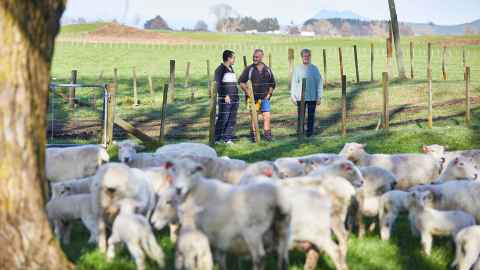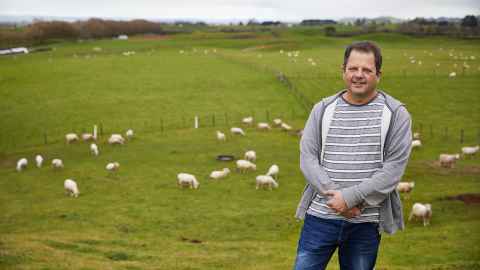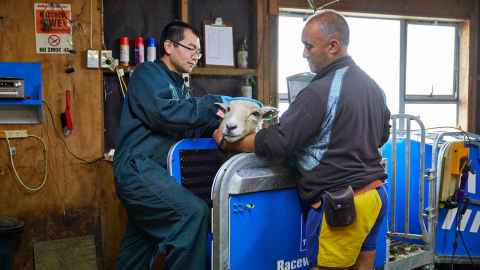Our duty of care

Treating research animals with care and dignity is not only the right thing to do from an ethical standpoint, it also produces better results.
“Any good animal science is based on good animal ethics, if you want accurate and informative data,” says Ngapouri research manager Dr Mark Oliver, who served on the University of Auckland Animal Ethics Committee for six years.
“A clear advantage of a facility like Ngapouri is that animals can graze outdoors in a habitat that is more characteristic of domestic livestock for extended periods of observational studies,” says Mark. “This may be for orthopaedic or medical device trials or basic animal growth trials. This is a very important welfare, health, and research quality benefit.
All animals at University of Auckland facilities are monitored by Animal Welfare Officer (AWO) Dr Jodi Salinsky, who makes regular visits to Ngapouri Research Farm. “We treat the animals as well as humanly possible,” she says. “We know it’s best for the animals to have positive experiences, to make their mental state and life as good as possible. Robust and translatable research outcomes are not possible without good animal welfare.”

The three Rs of animal research
The three Rs refer to replacement, reduction and refinement – replace live animal subjects with non-living alternatives or non-sentient animal models where possible; reduce the number of animals used to the minimum necessary to achieve meaningful results; refine experimental techniques so that welfare benefits to animals are maximised and the impact on animal welfare is minimised.
In 2009 Mark was awarded the National Animal Ethics Committee 3Rs award for animal welfare improvements for sheep-based biomedical research at Ngapouri Research Farm.
Happy animals, happy staff
That care leads to a better experience for the people who work at Ngapouri Research Farm too, says Mark. “Each animal at the farm has a lifelong health plan which includes drenches, vaccinations, and appointments with the large-animal vet. Ngapouri offers both a farm setting and research environment. The animals don’t always need to be confined indoors. Good animal care and welfare – that makes a happier workplace.”
Facility and livestock manager Gregg Pardoe and Mark go above and beyond usual farm practice in their animal welfare efforts. For example, they give lambs pain relief when they are castrated and their tails are docked, and hope to encourage more widespread use of pain mitigation for animal husbandry procedures in Aotearoa.

Innovative care
“We have introduced a commercially available device that allows local anaesthetic to be delivered to lambs at tail docking and castration,” says Mark. “This method has been shown in formal studies to reduce blood markers of acute pain responses by 50 to 70%. Some of our colleagues on nearby properties have used this for over 8000 lambs and report lower losses and better welfare.”
The University of Auckland is an inaugural signatory to the Openness Agreement on Animal Research and Teaching administered by the Australian and NZ Council for the Care of Animals in Research and Teaching (ANZCCART).
Research using animals is only conducted after consideration by the University Animal Ethics Committee (AEC), which assesses research proposals for their scientific and ethical justification. The AEC is made up of animal care staff, researchers, and external members independent of the University, including a lay member, NZVA appointed veterinarian, and person with expertise in animal welfare. Facilities, researchers, and animal care staff are committed to continually enhancing animal welfare practices and facility and veterinary staff are on call 24/7.